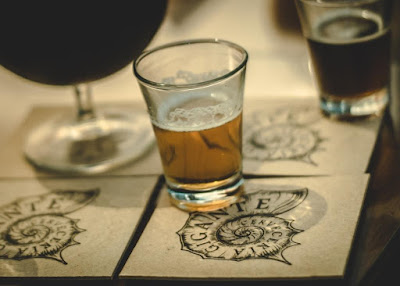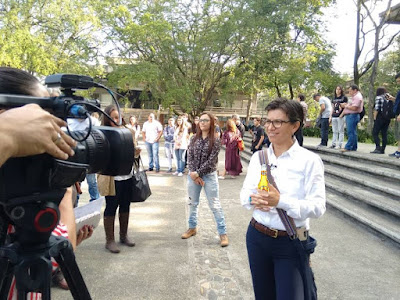When it comes to nearby escapes from the madness of Bogotá, we're not stuck for options. There's Choachí, Girardot, La Vega, Melgar, Pandi, Tobia and Villeta to name just some of the places we're familiar with. Each of those differs in terms of their tranquillity factor, but all are unquestionably more relaxing than the capital city.
We can't, however, say the same for the big town -- city by Irish standards -- of Fusagasugá. OK, on the weather front, it scores well; warmer than Bogotá, but not too stickily hot as some of the locations mentioned above can be. Yet, with a population of over 130,000, it's not quite a peaceful rural getaway.
In fairness, it's not marketed as that. Well, it's not marketed at all really, and with reason considering there doesn't seem much of interest to draw tourists. The pull factors tend to have nothing to do with the urban centre. For most of those who do go to the area, it's all about the rural retreats dotted around.
Yet cities and towns that don't rate high on the popularity scale have an attraction for us and, usually, we aren't disappointed (if you go not expecting too much, then it's easy to be satisfied; for example see previous posts on Buenaventura, Maicao and Turbo, to name just three).
So a stay in the centre of Fusagasugá with a couple of like-minded Irishmen seemed like a win-win plan. And in many ways, it was.
For starters, it's reasonably cheap in terms of food, drink and accommodation, especially compared to Bogotá. What's more, unlike some towns close to the capital and other locations in the regions, there is an abundance of well-kept attractive ladies about (that is to say, not carrying far too many pounds than they should be; each to their own and all that). Then you have the aforementioned agreeable climate.
That's about as good as it gets, though.
On arrival, not having a Colombian cédula (national ID) for the hotels there was a bit of a problem. It was hard work trying to convince them to let us stay.
We can't, however, say the same for the big town -- city by Irish standards -- of Fusagasugá. OK, on the weather front, it scores well; warmer than Bogotá, but not too stickily hot as some of the locations mentioned above can be. Yet, with a population of over 130,000, it's not quite a peaceful rural getaway.
 |
| Fusagasugá: It has a couple of things going for it, in fairness. |
In fairness, it's not marketed as that. Well, it's not marketed at all really, and with reason considering there doesn't seem much of interest to draw tourists. The pull factors tend to have nothing to do with the urban centre. For most of those who do go to the area, it's all about the rural retreats dotted around.
Yet cities and towns that don't rate high on the popularity scale have an attraction for us and, usually, we aren't disappointed (if you go not expecting too much, then it's easy to be satisfied; for example see previous posts on Buenaventura, Maicao and Turbo, to name just three).
So a stay in the centre of Fusagasugá with a couple of like-minded Irishmen seemed like a win-win plan. And in many ways, it was.
For starters, it's reasonably cheap in terms of food, drink and accommodation, especially compared to Bogotá. What's more, unlike some towns close to the capital and other locations in the regions, there is an abundance of well-kept attractive ladies about (that is to say, not carrying far too many pounds than they should be; each to their own and all that). Then you have the aforementioned agreeable climate.
That's about as good as it gets, though.
On arrival, not having a Colombian cédula (national ID) for the hotels there was a bit of a problem. It was hard work trying to convince them to let us stay.
You would have thought that the Colombian-issued cédula extranjería, the compulsory ID all visa-holding foreigners must have, would have worked fine. But no. After a long chat with one receptionist we managed to convince her that all would be OK. If the police had any issue -- the reason behind this reluctance to check us in -- we'd speak with them directly.
Pity those arriving with just a foreign passport, they'd have no chance it seems. This, though, rarely happens, it would seem.
Then there's the "people on edge" feel to things. Many appear to be lacking that relaxed, happy-go-lucky style that you'll find with Colombians in most other places (peak commuting hours in Bogotá excepted). No, in Fusagasugá it was more a "what are you doing here" attitude from a number of its inhabitants, and not in a friendly way, that.
One good representation of this was an off-duty policeman giving one of us an earful for, so it appeared anyway, no more than just because we were foreigners.
All this negativity might be down to the fact that the place tends to get types of a less-than-desirable nature spilling over from Bogotá -- the word for them in these parts being 'ñero'. Just a thought.
Now, not everybody was in fighting form it has to be said. The onset of dusk, however, is the signal for the feisty Fusagasugueños to come out in force.
So if you're planning to let the hair down in Fusagasugá some weekend, it's probably best to do it by day; leave the locals to their own devices at night.
_______________________________________
Facebook: Wrong Way Corrigan - The Blog & IQuiz "The Bogotá Pub Quiz".
Then there's the "people on edge" feel to things. Many appear to be lacking that relaxed, happy-go-lucky style that you'll find with Colombians in most other places (peak commuting hours in Bogotá excepted). No, in Fusagasugá it was more a "what are you doing here" attitude from a number of its inhabitants, and not in a friendly way, that.
One good representation of this was an off-duty policeman giving one of us an earful for, so it appeared anyway, no more than just because we were foreigners.
All this negativity might be down to the fact that the place tends to get types of a less-than-desirable nature spilling over from Bogotá -- the word for them in these parts being 'ñero'. Just a thought.
Now, not everybody was in fighting form it has to be said. The onset of dusk, however, is the signal for the feisty Fusagasugueños to come out in force.
So if you're planning to let the hair down in Fusagasugá some weekend, it's probably best to do it by day; leave the locals to their own devices at night.
_______________________________________
Facebook: Wrong Way Corrigan - The Blog & IQuiz "The Bogotá Pub Quiz".




